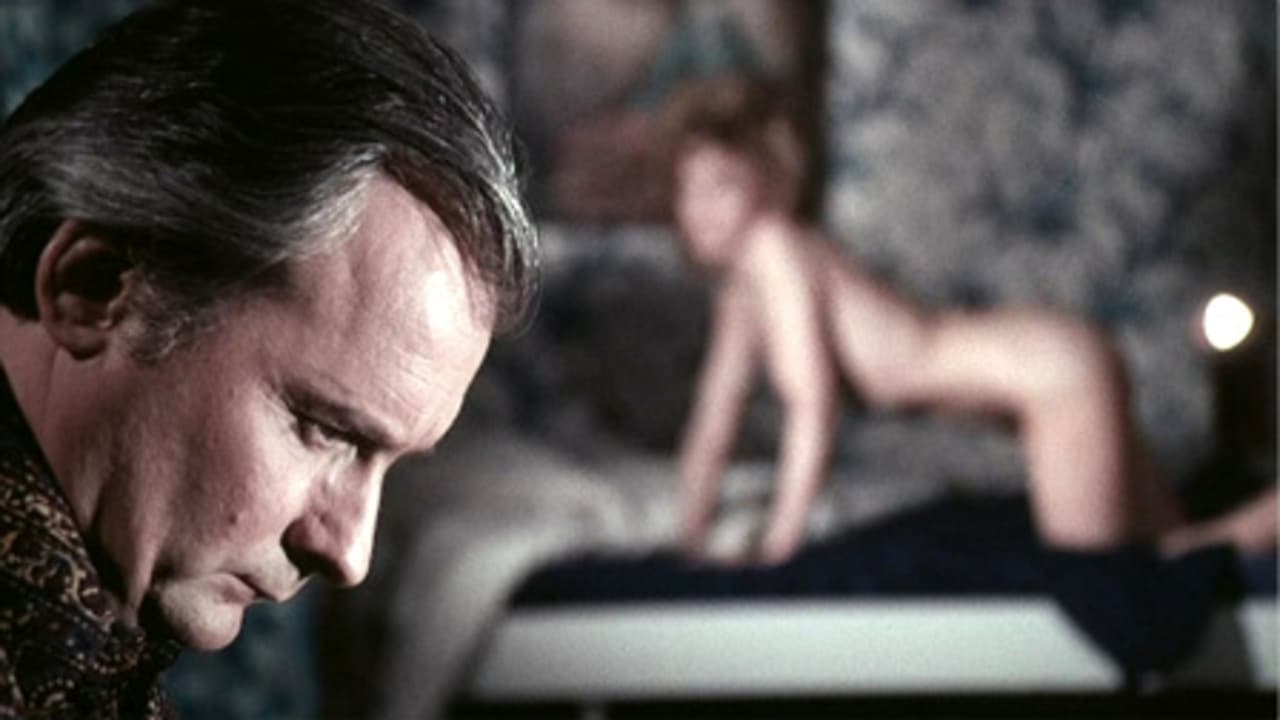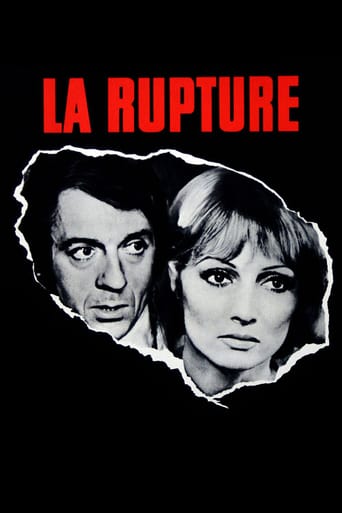Contentar
Best movie of this year hands down!
Invaderbank
The film creates a perfect balance between action and depth of basic needs, in the midst of an infertile atmosphere.
Kinley
This movie feels like it was made purely to piss off people who want good shows
Wyatt
There's no way I can possibly love it entirely but I just think its ridiculously bad, but enjoyable at the same time.
jandesimpson
As my purpose in writing these reviews is primarily to impart enthusiasm for films I greatly admire, I have little taste or time for rushing into print over ones that fall far short of outstanding. Let me say at the outset that I am a great admirer of Claude Chabrol at his best, I will go even further and claim that the trilogy of works he directed in 1969 and 1970, "La Femme Infidele", "Que la Bete Meurt" and "Le Boucher", dark, mesmerising yet compassionate explorations of disturbed human psyche, are among the crowning treasures of French cinema. I suppose the problem with Chabrol was that he was so prolific. Good as some of his later films were such as "La Ceremonie" and "Une Affaire de Femmes" he never again scaled those earlier heights. There are potboilers galore, mostly fairly watchable, though disappointing when one thinks of the past greatness of their creator. What to make though of "La Rupture", surely the most bizarrely outlandish of those far too many disappointments? A formidably wealthy grandfather (the most over-the-top of Chabrol's many swipes at the bourgeoisie) will go to any extreme to wrest control of his grandson from the boy's morally impeccable mother even though the youngster has sustained a serious head injury by his drug-ridden son, the boy's father. Next move to hire a shady layabout with a nymphomaniac girlfriend to trump something up that will prove the mother morally unfit to have custody of the boy. What better than to get girlfriend to dress up as mum, then for both of them to kidnap the mentally handicapped daughter of his and mum's landlady, feed the girl with drugged sweeties that will enable her to respond with pleasurable excitement to a depraved movie. To give this nonsense a semblance of artistic credence a mysterious balloon seller pops up from time to time in the local park suggesting some sort of symbolism and Pierre Jansen's atonal score punctuates the action with an aura of awesomeness that suggests something disturbing could be about to happen. Why am I bothering with all this? Simply to counter the many user reviews that express the view that "Le Rupture" is one of Chabrol's finest works. Its character types, the goodies - mother, the hospital doctor and the good-natured lawyer, the baddies - grandfather, the layabout and the layabout's girlfriend, the sillies - the card-playing elderly biddies and the histrionic actor in the guest house are all two- dimensional. All are light years away in depth from the husband driven by love and jealousy to act as he does in "La Femme Infidele", the bereaved father seeking some form of consolation in home movies of happy days past in "Que la Bete Meure" and the eponymous butcher whose love of the school teacher is heartrendingly impossible to reach any fruition given his background; reminders of the greatness Chabrol could be capable of achieving. In these he had something uniquely special to say about the nature of love.
jcappy
"La Rupture" (unsurpassed credit montage), serves as a glimpse, through two despicable characters, at masculinity unleashed, but at the same time its director, problematically--for him and the viewer, aligns himself with that same force.Monsieur Regnier and Paul Thomas, the rich man and the player, as a team, are in-- in the specific sense the film presents--the flush of power, their capacity for deception and violence unmitigated. Up against an array of very restricted lives, the romance of evil that surrounds them seems to be further amplified. Chabrol has a similar boundless power over these characters, but his is not expressed so openly, but is rather written into his style, language, and camera work, each of which can be impoverishing and disparaging. (It is not Mr. Regnier & Thomas, after all, who turn Emilie and Paul's mate into sexed items for the viewers pleasure or displeasure).Interesting that all the characters under the thumb of these convergent men are a group of insignificants who are either female or aligned with the female world, and with whom, despite their low status and victimization, Chabrol only occasionally sides. The actor boarder can be brave, and of course Helene can and does have a complex inner life and a defiant spirit (one albeit that's too costly) Yet, even she seems almost permanently glazed over, distressed, and exhausted. And her endless mothering of son and husband, while performing as a barmaid and being stalked--and drugged, is not exactly an argument for an independent identity.But look at the meager others. All live in a tiny sphere which amounts to a hospital lobby and a constrictive gray boarding house in Brussels. The doctor is no more than a bit actor in a play, entering and exiting his scenes on cue. The landlady is portrayed as a puritanical prude, who inflexibly rules her cloistered hotel in the manner of a mother cop. Her husband is the stereotypical castrated husband, small in stature, reclusive, passive, unable (and unwilling) to stand up to his daunting wife. Emilie, their learning-disabled limp daughter is an uncomfortably overlarge doll in a disarrayed white dress and showy glasses, who might be more appropriate to a porn factory and who ends up pornified in the end. No doubt we are instructed to think of her as the sole offspring of her anti-sex mother. Thomas' over-sexed playmate has label written all over her--the woman who can't get enough, who is so lusty and lusting that the thought of dressing never occurs to her--over more than a few camera visits. The three old women--or witches here--are not the three graces of Joyce's "The Dead." They are rather laughable loners who are much less primordial witch than dried up card-playing spinsters stringently served up as the three-witches symbol. Finally, Helene's husband is no more than a kind enraged distortion let loose on the world by his power-mongering and greedy father, which in turn aligns him here with the female camp--making him vulnerable onto death.In short, Chabrol exercises little vigilance or care for his characters. The undercurrents of hostility and misogyny have a kind of cumulative effect of manipulation and point to a lack of directorial integrity. His characters need more interiority and less violation. Hiding behind style, chicness, specious symbols, and technique doesn't cut it. I think a less heavy had and a less heavy mind is in order.
MartinHafer
While watching this film, I found myself really hooked. I liked the plot about a woman who is divorcing her violent drug-addicted husband and his rich parents' evil plot to take their grandson. This was very compelling and fascinating--especially when, for the sake of their own egos, they are willing to fabricate a case against the poor mother in order to get "their property". And, the scumbag guy who insinuates himself in her life in order to create evidence she is an unfit mother is a wonderful plot device. Unfortunately, when the movie reached its climax, it very quickly ran out of steam and the realism went out the window. Now, instead of believable machinations, there was a completely inane segment about molesting a retarded woman and blaming the mother, slipping LSD into the lady's orange juice and a final showdown that comes completely out of no where between the violent (but repentant) husband and the sleazy guy trying to frame the lady. None of this made any logical sense and the only thing I liked about the final portion at all was how smart the heroine acted when she was called out on a wild goose chase--telling the cabbie "look at me and remember my face" so she could provide an alibi about where she was. If the movie were re-filmed and the final section re-done, it could have been magnificent. As is, it's a movie you might as well skip.
suspira78
If one was to choose a 'French' equivalent of Hitchcock, I would say Claude Chabrol is the closest you can get. 'La Rupture' is a must for those who don't know the director's talent and thus art. As always, I would truly advise people to see this in French with subtitles for dubbed films aren't as accurate.

